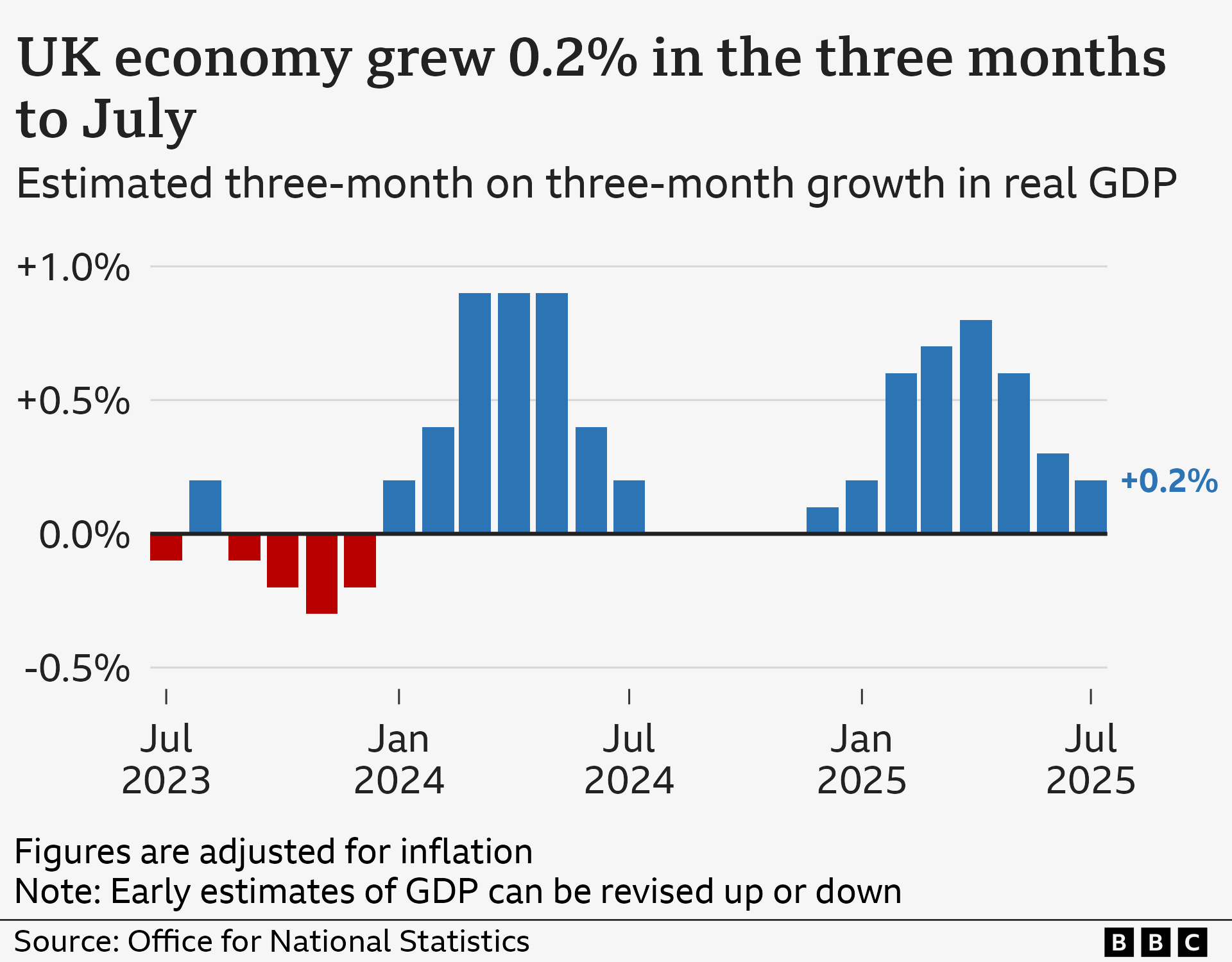UK economy saw zero growth in July

- Published
The UK economy failed to grow in July, following the biggest contraction in manufacturing output for a year.
The Office for National Statistics (ONS) said the economy saw zero growth in the month, which was in line with expectations, following a 0.4% expansion in June.
However, monthly figures are volatile, and the ONS has said it will now focus on growth over a rolling three-month period. In the three months to July, the economy expanded by 0.2%
The government is under mounting pressure to deliver on its key priority of boosting economic growth ahead of the Budget on 26 November.
In the Budget, Chancellor Rachel Reeves will outline the government's tax and spending plans with increasing speculation she will raise taxes to meet her self-imposed fiscal rules.
The ONS said the service sector grew by 0.4% over the three months to July, helped by a good performance from the health sector, computer programming and office support services.
However, this was offset by a fall in output from the production sector, which includes manufacturing. In July itself, manufacturing contracted by 1.3% - the sharpest monthly decline since July last year.

The UK economy expanded by 0.7% in the first three months of the year, and then grew by 0.3% between April and June.
The ONS said the latest figures showed the economy had "continued to slow" over the past three months.
However, it is still on track to grow in the third quarter.
Rob Wood, chief UK economist at Pantheon Macroeconomics, said the UK's finances were "looking pretty resilient to the barrage of shocks faced this year".
The latest data also comes ahead of the Bank of England's next interest rate decision on 18 September, with policymakers weighing up flagging growth against stubborn inflation.
'Sign of things to come'
Reeves is widely expected to raise taxes in the Budget if she wants to meet her self-imposed rules on the economy.
These are:
day-to-day government costs will be paid for by tax income, rather than borrowing by 2029-30
to get debt falling as a share of national income by the end of this parliament in 2029-30
Estimates for the size of the "black hole" in the public finances that Reeves needs to fill in order to meet her rules vary widely, between £18bn and £50bn, but the chancellor has rejected the latter forecast.
Since Labour pledged in its manifesto last year not to raise taxes on "working people" - namely income tax, National Insurance and VAT - speculation is growing around what changes she might make.
Companies have long spoken of the financial hit they have taken from a rise in employers' National Insurance Contributions (NICs) and the minimum wage that came into force in April.
And some have warned that tax rises for business could hamper growth further, with some saying they are holding off on hiring or investing until the details of the Budget become clear.
Yael Selfin, chief economist at KPMG UK, said the "weak start to the third quarter [is] a sign of things to come".
"Economic activity is expected to slow in the second half of the year as the temporary factors which pushed up growth in the first half of 2025 begin to fade," she said.
"Additionally, the later date of the Autumn Budget could prolong some uncertainties for businesses, delaying investment decisions and acting as a drag on growth until more clarity emerges."
Responding to the latest growth figures, a Treasury spokesperson said: "We know there's more to do to boost growth because whilst our economy isn't broken, it does feel stuck.
"That's the result of years of underinvestment, which we're determined to reverse through our plan for change.
Shadow chancellor Sir Mel Stride said: "Any economic growth is welcome - but this government is distracted from the problems the country is facing.
"While the government lurch from one scandal to another, borrowing costs recently hit a 27-year high - a damning vote of no confidence in Labour that makes painful tax rises all but certain."
Liberal Democrat Treasury spokesperson Daisy Cooper MP said: "The government talks of going full throttle on growth but the reality is they have left the handbrake on.
"Their growth-crushing jobs tax risks hollowing out our High Streets and ministers' refusal to jettison their short-sighted red lines on cutting red tape with Europe is holding back our exporters."